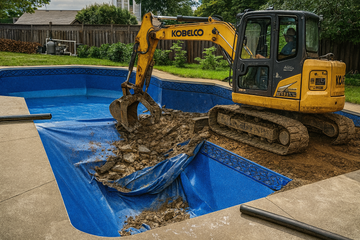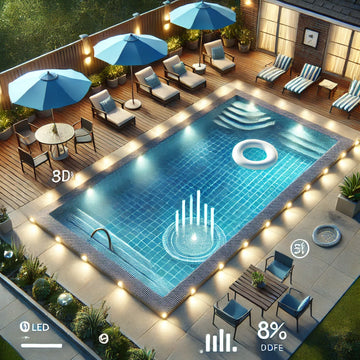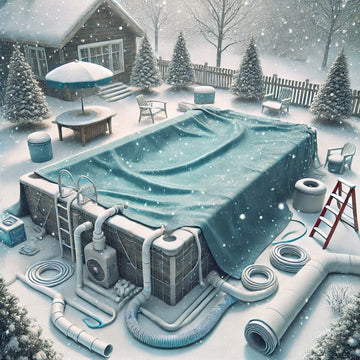Take Your Summer to the Next Level with Your Own Inground Pool
As the weather heats up and most beaches remain closed, the idea of putting an inground pool in your back yard may have crossed your mind. Purchasing, installing and maintaining an inground pool may seem like a daunting undertaking at first. When considering the idea, you’ll probably hear a significant amount of mixed advice from friends and acquaintances. You may also be turned off by warnings of costly maintenance and time-consuming upkeep.
However, it’s important to understand that these ‘warnings’ should be taken with a grain of salt. There are quite a bit of misinformation and “alternative facts” floating around about inground pools, especially online. In fact, some of the most common “negatives” associated with pool ownership are not true at all.
Before putting your inground pool fantasies to the back of your mind for good, tag along as we debunk these popular myths about owning an inground pool.
Most Common Myths About Owning an Inground Pool:
1. Pools Require Frequent Expensive Repairs
If you take care of your pool and keep it in top shape, you will rarely need to perform unexpected repairs or refurbishments. This includes cleaning and maintenance, but there are also things you can do from the get-go to make sure it will be smooth sailing for the rest of your pool’s lifespan. When choosing a company to install your pool, do your homework on the builder’s past work and ask questions about the longevity of the pool types you are considering.
Of course, sometimes, things happen that are beyond your control. Unfortunately, mechanical systems can break down. The most common repair associated with pool ownership is repairing tears in the liner. However, with regular, normal maintenance you’ll be able to detect potential problems before they even happen.
2. Balancing Pool Chemicals Is Too Complex
The thought of working with pool chemicals can be a turn-off to some, but it is actually quite safe and takes next to no time at all. You may have heard that you need to shock your pool once a week, but there are automated systems in place – like the saltwater system – that makes life much easier. You should still do weekly checks, but in reality, chemical adjustments are mostly performed on a monthly basis.
Thanks to advancements in our knowledge of chemistry and technology, pool chemicals today have been fine-tuned, whereas a long time ago—30 years or more—this wasn’t the case.
3. They’re Expensive and Time-Consuming to Operate
Naturally, there is a cost associated with owning and maintaining a pool. There are costs for the water, power for heaters and pumps and chemicals you’ll need, but if you compare the cost of these items with the enjoyment you’ll get out of your pool, it’s worth it. In comparison with other recreational things like a boat or an RV, surprisingly, the cost to operate a pool is much less. Go figure!
When it comes to utility bills, it can vary depending on your provider and where you live. On average, however, estimates show that utility bills increase by only $30 to $50 each month with the addition of an inground pool. You can install a variable-speed pump that runs 80% cheaper than a regular single-speed pump, raising your monthly cost by only $5 to $20. Taking into consideration the extra costs associated with visits to the beach or the community pool, such as gasoline, food, and concessions, you’ll find that the investment is more than worth it.
Plus, pools are simply easier and more convenient to enjoy! In fact, it is easier to maintain your pool than it is your car or your lawn. If you have a little extra pocket money, you could always hire a professional to do the job, today’s cost-effective technology allows you to get the same great results in no time. Often, pool owners will hire a professional to open their pool in the spring and are able to easily maintain it themselves for the rest of the season!
You can also make it even easier (and less expensive) to open your pool in the spring by treating it with chlorine and/or algaecide before you close it for the season, and by performing some light winter maintenance to help prevent algae growth over the winter months. Your pool will not be as green come springtime, and you won’t have to spend as much money on chemicals and treatments.
4. Pools Are Dangerous and Cause Accidents
Many people never dive into pool ownership due to safety concerns associated with inground pools. However, responsible pool owners know that most accidents can be easily avoided by adding an automatic safety cover. An automatic pool safety cover is made of strong and durable materials that covers the water in a pool. They are custom-made to fit pools perfectly, providing a tight seal that keeps children and animals out of the pool when it is not in use. As a bonus, they also help keep pools clean and warm.
You can also increase the safety of your pool by installing an alarm or pool fence around the perimeter of your inground pool with a locking gate to keep young children safe. Ultimately, proper supervision is the best way to avoid a household accident. However, some experts believe that having a pool actually saves lives in the long run. Children who learn to swim at an early age are less likely to drown in an emergency situation later in life.
5. I Can’t Afford to Build One
While the financial requirements for purchasing and installing your inground pool may seem outrageous at first glance, there are ways to get it done on a budget. There are many reasonably priced options for everything from the type of pool to the materials, accessories and landscaping you’ll need to make your dreams of owning a pool a reality. There are also ways to get a great deal on your pool installation, such as scheduling the construction for the end of summer or early fall.
Plus, owning a pool is a great long-term investment to offset other expenses your pool will eliminate, like the cost of vacations, membership fees for community pools and gyms, and other recreational activities.
6. It Will Decrease My Home’s Value
An inground pool can be a great investment, not just for entertainment, but also for your property value. Contrary to popular belief, inground pools have the ability to increase your property value, whereas an aboveground pool is usually just considered an eyesore. As long as your inground pool is attractive, suits your backyard visually and is well-maintained, then your home’s value won’t be going anywhere but up. This is easy to achieve with a little planning and TLC.
Indoor pools can be custom designed and built to suit your space, no matter the size and shape of your yard. To really amp up the visual appeal, make sure your pool’s design allows for enough green space for a patio, garden and efficient traffic flow. You can also add custom add-ons like lighting, water features and tile designs. This will make your yard more attractive to future buyers, and also more enjoyable for you!
The Bottom Line
If it has been your dream to throw your very own epic pool party, why wait any longer? With a little research and planning, you can make your dream a reality with less time, money or effort than you ever thought possible. An inground pool is a great investment for yourself, your family and friends and, not to mention your home.
Ready to get the ball rolling? Contact us to book an appointment!




